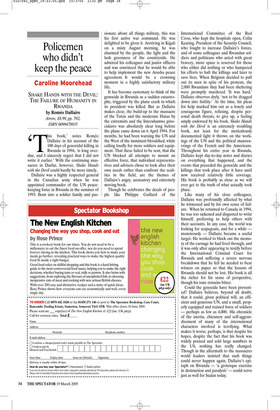Policemen who didn’t keep the peace
Caroline Moorehead
SHAKE HANDS WITH THE DEVIL: THE FAILURE OF HUMANITY IN RWANDA by Roméo Dallaire Arrow, £8.99, pp. 592, ISBN 0099478935 ‘This book,’ notes Roméo Dallaire in his account of the 100 days of genocidal killing in Rwanda in 1994, ‘is long overdue, and I sincerely regret that I did not write it earlier.’ With the continuing massacres in Darfur, however, Shake Hands with the Devil could hardly be more timely.
Dallaire was a highly respected general in the Canadian army when he was appointed commander of the UN peacekeeping force in Rwanda in the summer of 1993. Born into a soldier family and pas sionate about all things military, this was his first active war command. He was delighted to be given it. Arrriving in Kigali on a misty August morning, he was charmed by the people, the light and the lush greenness of the countryside. He admired his colleagues and junior officers and was convinced that he would be able to help implement the new Arusha peace agreement. It would be a crowning moment in a highly satisfactory military life.
It has become customary to think of the genocide in Rwanda as a sudden catastrophe, triggered by the plane crash in which its president was killed. But as Dallaire makes clear, the build-up to the massacre of the Tutsis and the moderate Hutus by the extremists and the Interahamwe génocidaires was absolutely clear long before the plane came down on 6 April 1994. For months, he had been warning the UN and the West of the imminent bloodshed, while calling loudly for more soldiers and equipment. That these failed to be sent, that the UN blocked all attempts to mount an effective force, that individual representatives and advisers chose to look after their own needs rather than confront the realities in the field, are the themes of Dallaire’s angry, accusatory and extremely moving book.
Though he celebrates the deeds of people like Philippe Gaillard of the International Committee of the Red Cross, who kept the hospitals open, Colin Keating, President of the Security Council, who fought to increase Dallaire’s forces, and of some colleagues and Rwandan soldiers and politicans who acted with great bravery, more space is reserved for those who either did nothing or who hampered his efforts to halt the killings and later to save lives. When Belgium decided to pull out its men in spite of his protests, the 2,000 Rwandans they had been sheltering were promptly murdered. ‘It was hard,’ Dallaire observes dryly, ‘not to be dragged down into futility.’ At the time, his pleas for help marked him out as a lonely and courageous figure, refusing, despite personal death threats, to give up, a feeling amply endorsed by his book. Shake Hands with the Devil is an extremely troubling book, not least for the meticulously documented light it throws on the workings of the UN and the political manoeuvrings of the French and the Americans. Throughout his entire year in Rwanda, Dallaire kept day-to-day notes and diaries on everything that happened, and the events that preceded the genocide and the killings that took place after it have until now received relatively little coverage. His book is probably as close as we will ever get to the truth of what actually took place.
Like many of his close colleagues, Dallaire was profoundly affected by what he witnessed and by his own sense of failure. When he returned to Canada in 1994, he was too sickened and disgusted to write himself, preferring to help others with their accounts. In any case, the world was looking for scapegoats, and for a while monstrously — Dallaire became a useful target. He worked to block out the memory of the carnage he had lived through, and it was only after appearing to testify before the International Criminal Court for Rwanda and suffering a severe nervous breakdown that he felt he needed to bear witness on paper so that the lessons of Rwanda should not be lost. His book is all the richer for his sense of perspective, though his tone remains bitter.
Could the genocide have been prevented? Dallaire believes, beyond all doubt, that it could, given political will, an efficient and generous UN, and a small, properly equipped and trained force of soldiers — perhaps as few as 4,000. His chronicle of the inertia, chicanery and self-aggrandisement of many of the international characters involved is terrifying. What makes it worse, perhaps, is that despite his hopes, despite the fact that his book was widely praised and sold large numbers in the US, nothing has really changed. Though in the aftermath to the massacres world leaders insisted that such things could never happen again, Dallaire’s epitaph on Rwanda — ‘a grotesque exercise in destruction and paralysis’ — could serve just as well for Sudan today.
















































 Previous page
Previous page